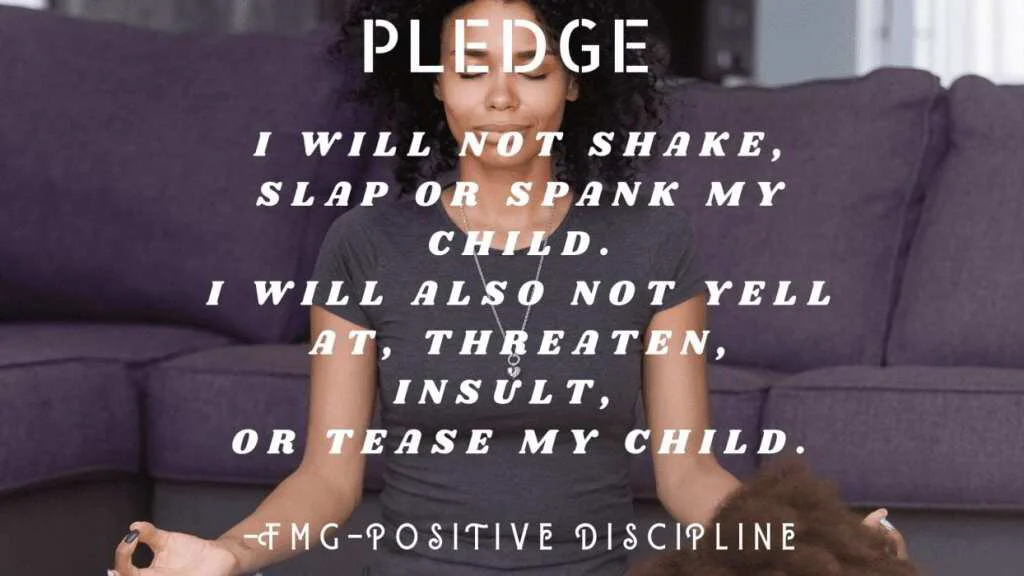
Most parents would agree that trying to get children to comply can be super frustrating. I know this because I had been there numerous times, and then I found out the favorable developmental outcomes of positive discipline.
First, let’s distinguish between punishment and positive discipline. Punishment is when parents or caregivers use physical force like spanking, hitting, beating, kicking, or shaking. Punitive measures could also include yelling, time-outs, and taking away children’s privileges.
On the other hand, discipline literally means “teach”; therefore, positive discipline is a non-violent method of correcting children—these disciplinary moments are often viewed as teaching opportunities for parents.
Scientifically Proven
It is noteworthy to point out that there has been increasing research reporting on numerous developmental issues associated with using punishment to gain immediate compliance in children.
Conversely, studies have shown favorable outcomes in children when parents use positive discipline. This method of discipline promotes cognitive, social, and emotional development.
Parents do not have to feel stuck in the old way of parenting, where it is believed that “if a child doesn’t feel hurt, pain or shame, they wouldn’t learn.” There is no science to back up this theory.
“Where did we ever get the crazy idea that in order to make children do better, first, we have to make them feel worse? Think of the last time you felt humiliated or treated unfairly. Did you feel like cooperating or doing better?”
― Jane Nelsen
The Basic Needs of a Child
It is crucial to know what children need; otherwise, it is tough to satisfy these needs. Do you ever wonder why your kids fuss so much? Often, they just need your attention.
Children want to feel a sense of belonging and significance. In a nutshell, they want to feel connected to you, and this typically happens when parents make an effort to spend quality time with their children.
As adults, male or female, we all need to feel a sense of belonging and significance. It is more so for children because the world is new to them, and finding where they fit into it is crucial.
Most parents are busy and often find it challenging to make time for their children, but finding time to bond with your child makes them feel important and loved. Ten to fifteen minutes of your undivided attention, preferably doing an activity of their choice, would do the trick.
Moreover, misbehaviors are often to let you know that they need your attention. Giving them your time is often the magic wand to lessening temper tantrums.
Stop! I Can Do It Myself “Autonomy”.
Power Struggles happen when children become outright rebellious. Note, this isn’t a plot to stress you to grey hair; rather, it is a developmental stage where they seek independence.
Often, parents want everything to be perfect, consequently depriving children of the opportunity to learn. The direction is important, but more important is giving kids the chance to make mistakes and learn from them hence developing autonomy.
Have you ever noticed the sense of pride on a child’s face when they, on their own, accomplish a goal? This is how they build self-competence and confidence.
These behaviors vary depending on the child’s age, but this is more common in preschoolers. They want to control certain aspects of their lives, and parents need to learn that the “because I said so attitude” does not work for concrete minds.
They ask many “whys” and need answers as to why they aren’t allowed to do certain things. Give them your reasons, but don’t expect them to agree with you. Responding with Because I said so will only cause rebellious behaviors.
Family Contributions/Chores
Teaching your kids social skills is essential to their social development. It does not have to be anything significant. For example, my six-year-old daughter is responsible for making her bed, taking a supervised shower, putting on her clothes, and refilling the refrigerator with water bottles.
Expose your kids to as many social skills as possible. For example, get used to the mess of cooking with your children. They love doing activities with their parents, and this teaches them self-worth and reduces the feeling of self-entitlement.
Things to Consider Before Punishing
“Children are more motivated to cooperate, learn new skills, and offer affection and respect when they feel encouraged, connected, and loved.”
-Jane Nelson
The truth about punishment is that it gives parents the satisfaction of seeing children comply with their commands, often at the detriment of long-term developmental problems in children.
The potential risk associated with punishment on the overall well-being of children isn’t worth the immediate satisfaction of the parent. Yes, punishment will scare children into cooperating, but this is only short-term and does not affect real change.
It may help to focus on how to help your child feel a sense of significance and belonging. Moreover, when a child is punished repeatedly when really they should’ve been taught or given the tools to learn from their behaviors. It becomes unfair to ask them to be respectful and responsible when all they’ve experienced is hurt, shame, and disrespect.
The guilt parents feel after punishing their kids is enough to consider other disciplinary methods, and positive discipline has been scientifically proven to work both for parent and child.
Parents should perhaps focus less on their feelings in misbehaving moments because punishment is typically a result of a parent’s anger towards a child’s non-compliance.
To better understand positive development, it is vital to get into learning the developmental process of children. Having this knowledge better prepares parents to understand and handle behaviors appropriately.
Take the pledge today to stop punishment.
Growing research has shown punishment to promote low self-esteem, shame, doubt, fear, guilt, and worthlessness. Moreover, children do not listen when they feel this way, and punishment has been shown to impair cognitive development. Practice positive discipline, which involves being kind but firm.
Now, You May be Wondering – What Can a Parent Do?
It’s essential to remember that nobody wants to be bossed around all the time. As much as you hate that, children do too. So, it is necessary to get children involved in activities and not just a bunch of commands and lectures.
Is there a particular area you are struggling with your children, like a bedtime routine? Get your kids involved in creating a bedtime schedule. Give them options in this activity and allow them to choose.
Repeat the agreed time schedule for each activity and make sure they concur, then hang it in a visible area in your home. When it’s time for each activity, make sure you give them a transitional warning time. For example, “In five minutes, it’ll be time to go brush your teeth
Consistency is Key
An essential part of the positive discipline process is staying consistent. So, when the five minutes are up, they will push for more time, but with kindness and firmness, the answer should be, “No, my love, as agreed, it’s time to go brush your teeth now.”
Some issues are obviously more significant than others and may not work using this process, but it is necessary to think deeper about the behavior you would like to see change in your child.
Look inward to see how you perhaps contribute to this problem. Set short-term goals for yourself. For example, when my child refuses to comply, I will take deep breaths to calm down or take a time-out.
“A short-term goal is excellent to affect long-term change and sometimes slowly breaks cycles.”
Labellesviews
Positive discipline is different from what we are used to and can be challenging at first, but the rewards are priceless. Give it a try and enjoy its many benefits both for you and your children.
Dr. Jane Nelsen, who is a psychologist and parent coach, states that positive discipline does not mean letting children off the hook. It helps focus on the solution and teaching, not the problem. “Like she often says, children do better when they feel better.”
Childrearing is tough, and as long as you put your best foot forward every day, everything will eventually fall into place. Thank you for reading; please let me know what you think about positive discipline in the comment section.
You May Also Like This…..









I’ve been surfing on-line greater than three hours lately, but I by no means found any fascinating article like yours.
It is lovely worth sufficient for me. In my view, if all site owners and bloggers made just right content materal aas you probably did,the net will probably
be much more helpful than ever before.
After looking over a handful of the blog articles on your
website, I truly like your technique of blogging. I saved it to my bookmark webpage
list and will be checking back soon.
Zengin, güzel ve şımarık bir genç kadın olan Melanie Daniels (Tippi Hedren), San Francisco’daki bir evcil hayvan dükkânında yakışıklı ve ilginç biri olan avukat Mitch Brenner (Rod Taylor) ile tanışır. Melanie, Mitch’in bu dükkânda ona oynadığı küçük oyuna kızsa da ondan hoşlanır. O gün Mitch’in, kızkardeşinin doğum günü için aradığı fakat bulamadığı kuşları satın alır ve bunları hediye olarak Mitch’in Pasifik kıyısındaki küçük bir kasaba olan Bodego Bay’deki evine götürmeye karar verir. James Monts
whoah this weblog is wonderful i really like reading your
posts. Stay up the great work! You realize, lots of persons are looking around for this information, you could aid them greatly.